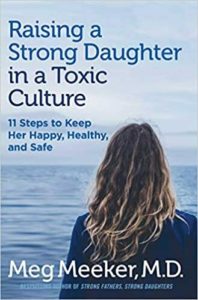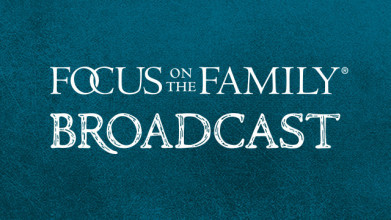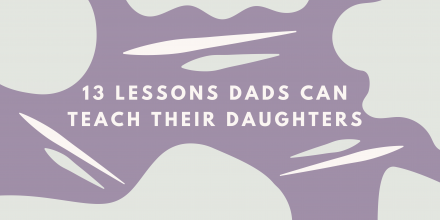Preview:
Dr. Meg Meeker: Developing a strong, deep relationship with a father with a daughter or a mother with a daughter, that’s what’s going to change that daughter and root her so that when she hits her 20s, she has her wits about her, she has her faith, and she knows who she is.
End of Preview
John Fuller: That’s Dr. Meg Meeker, who has a wealth of information and help for you if you’re a parent with daughters, and she really has a way of getting to the heart of the issue and identifying those core needs that our kids have. Uh, Dr. Meeker is with us again on Focus on the Family to continue the discussion we began last time. Your host is Focus president and author Jim Daly, and I’m John Fuller.
Jim Daly: Uh, John, last time we spoke to Dr. Meg about a variety of things. Feminism, uh, the things that moms need to make sure they’re doing to ensure, as best as possible, uh, that their daughters are understanding their identity, who they are, and answering those tough questions. And if you missed last time, uh, get the download… download the app, you can listen, uh, off your smartphone and, uh, get that content. We’re covering her excellent book, uh, raising a Strong Daughter in a Toxic Culture, and I’m looking forward to today’s conversation.
John: I am too. We’ve got that book here at Focus on the Family. Do give us a call, uh, for your copy.
Jim: Dr. Meg, welcome back to Focus.
Dr. Meeker: Well, thanks for having me, Jim.
Jim: (laughs) It’s so good to have you here. I don’t want to, uh, ask a leading question, but, uh, how long have you been practicing as a pediatrician?
Dr. Meeker: Oh, my. It’s about 32 or 33 years.
Jim: So, the point of that is, experience pays off.
Dr. Meeker: Okay.
Jim: You have seen a lot of, uh, teenage girls particularly, right?
Dr. Meeker: Thousands.
Jim: Thousands?
Dr. Meeker: And, and I… you know, and one of the things I love, I love to see and answer questions of parents and kids who are really struggling with tough issues. And-
Jim: Give us an example of that.
Dr. Meeker: Kids who are wanting to run away, kids who are on drugs, and they have two parents at home and parents are beside themselves and they don’t know what to do. One of the struggles we have now is around the gender issue.
Jim: Sure.
Dr. Meeker: And, um, the… or the other thing, you know, we have some Christian parents, and their daughter comes in at 16 or 17 and they find out she’s sexually active. What do they do? So, I have to deal with parents who feel very, very guilty, and then I have to deal with a daughter who feels guilty and sort of reset them, so… and I love to talk to kids and teenagers about sex.
Jim: Yeah.
Dr. Meeker: Isn’t that crazy?
Jim: Oh, no, it’s healthy.
Dr. Meeker: And, and high school students. I mean, and parents say, “Well, they don’t wanna talk about that.” Oh, yes, they do. And it’s really fun because, you know, God has given us a healthy path through just about everything. And when you bring that in the path and you talk to kids or parents about that path, it feels so good, it feels so right, it’s so healing. And you can see eyes light up. I see eyes light up in kids when I’m talking to them about why having sex with three partners when you’re 17, 18, you’re 20, can cause depression. The boys say, “Well, no one told me that.
Jim: Hmm.
Dr. Meeker: “Is that why I feel so bad?”
Jim: Yeah. Uh, you know, we’re here. I was wanting to ask these questions in a moment but since we’re here, let’s go for it. Uh, something like 40%… in your book, you state 40%, uh, of teen girls are sexually active. Um, that is lower than half-
Dr. Meeker: Mm-hmm.
Jim: … which is good, but it’s still an incredibly high number.
Dr. Meeker: It is. And I will tell you, I think the reason they’re sexually active is, um, they get a lot of pressure from boys. And as we were talking before, girls who are nice and kind and conscientious don’t wanna say no because no one’s taught them to say no. They also have a lot of pressure from the media. And everyone is saying-
Jim: Oh, is that one of them?
Dr. Meeker: “… Media, media,” but, but social media-
Jim: Peer pressure?
Dr. Meeker: Peer pressure. As a matter of fact, I routinely say to girls in my practice, high school girls, “What are the two or three biggest, um, trouble spots for you? What are the biggest pressures that you deal with, if you just could boil it down?”
Jim: It’s a good question.
Dr. Meeker: And without skipping a beat, they say, “Being thin enough and having sex.”
Jim: Mm-hmm.
Dr. Meeker: Always. And I say, “Well, tell me about that.” “Well, I’m, I’m just never thin enough, okay? So, I always have to diet.” And they get that message from third grade on.
Jim: Wow.
Dr. Meeker: A- and then the messages about sex because they see it everywhere. I’m sure you’re aware of the recent movie, Cuties?
Jim: Yeah, I’ve heard a little bit about it.
Dr. Meeker: On the cover-
Jim: Yeah.
Dr. Meeker: … there are 11-year-old girls-
Jim: Yeah, it’s terrible.
Dr. Meeker: … dressed in black stuff in sexual postures and positions. And so many parents… Netflix is bringing out, so many parents wrote and so they changed the cover. Well, I don’t know, they changed the movie. But even seeing a photo like that, if you’re 14-
Jim: Right.
Dr. Meeker: … and these girls are 11, you’ve missed the boat. And so, they need to engage in sexual talk. They need to act like they’re open, at least to boys, to be accepted. And remember, as we talked last time about having, “Am I significant? Do I have value?” One of the ways they can feel significant, even if it’s superficial, is to act sexually attractive and sexually open, even if they don’t want it. And I think, um, the other reason girls are sexually active is they don’t feel they have a good reason not to be.
Jim: Yeah. What is that reason, for that mom, particularly, who’s gonna have that discussion with their 15-year-old girl in their Christian home?
Dr. Meeker: Okay.
Jim: What’s that answer-
Dr. Meeker: Oh.
Jim: … the one that mom has to deliver?
Dr. Meeker: Easy. Easy, easy. I’ve delivered it a million times to girls I don’t know. First of all, God made you to respect and love and protect yourself. God made you so beautiful. You’re the temple. You’re a temple. The Holy Spirit lives in you. And um, the next reason is that you were created to be strong and to say no to people and to not accept things, um, before you want them. We know, we have great studies to show that it leads to depression. We know that sexual activity in young girls and-
Jim: It’s gonna be damaging.
Dr. Meeker: Damaging-
Jim: Yeah.
Dr. Meeker: … psychologically. You’re gonna feel worse about yourself. “No, I won’t, mom. No, I won’t, mom. I’ll be accepted.” No, you don’t. Um, and then third, physiologically. Um, and then I say to them, I pull out the zinger, “Do you know why you got your Gardasil? Did your doctor ever tell you why you got your Gardasil?” “No.” Well, I say, “Then we need to have that conversation.”
John: And for those listening, Gardasil is-
Dr. Meeker: It’s, it’s a vaccine for HPV, human papillomavirus, which causes cervical cancer in girls, in young girls. So now I say to girls, “We are… diseases are such an issue among young kids, particularly young girls, ’cause your anatomy… we have to immunize you now against a sexually transmitted infection. That’s, that’s serious. Sexual activity is so serious, um, that we need to do that.” So, he-
Jim: Hmm.
Dr. Meeker: … those are just a few of the big reasons. So, you don’t even have to say, which you certainly can, “It’s wrong to do.” You can start with a medical stuff and then move into, “Your body is too precious-
Jim: Hmm.
Dr. Meeker: “… and, uh, the temple of the Holy Spirit.”
Jim: Well, and I so appreciate that. You know what I’m trying to teach my boys, I don’t have, again, the, the honor of raising girls, but trying to teach them that, you know, “God’s given you this wedding present-
Dr. Meeker: Mm-hmm.
Jim: “… and he wants you to keep it wrapped.” (laughs) You know?
Dr. Meeker: Exactly.
Jim: And he wants you to explore that-
Dr. Meeker: Mm-hmm.
Jim: … when you get married with that woman he brings into your life-
Dr. Meeker: Mm-hmm.
Jim: … for a lifetime.
Dr. Meeker: I used-
Jim: I’ve tried to continue to message that-
Dr. Meeker: But, but-
Jim: … since they were little.
Dr. Meeker: Here’s… exactly. And I find, in many instances, teen boys are more sensitive than teen girls. That’s exactly-
Jim: Interesting.
Dr. Meeker: … yeah, what, exactly what I taught our son. And after he went off to college, a couple of years into college, he (laughs) and a friend of his called me with questions about why he should continue to stay abstinent. And I thought, “That is so cool.”
Jim: (laughs) It is.
Dr. Meeker: But here… but here’s, here’s what I tell kids, particularly boys, “You know, God you… made your body to be sexually active from 15 to about, you know, 75 or 80. So that’s a lot of years.
Jim: Yeah.
Dr. Meeker: “That’s maybe 70 years.” And the look over their faces is, “Are you kidding me?” And I say, “Are your parents alive?” “Oh, that’s horrible.” And then I say, “Are your grandparents alive?” And they wanna rock, either run, but I say, “Here is my point. If you want a great 40 years, you need to listen to what I’m gonna tell you over the next 10 years.
Jim: Huh.
Dr. Meeker: “And if you really want great, uh, relationships, your wife for that long a period of time, then you need to pay attention to what you do in the next five years.”
Jim: Wow.
Dr. Meeker: They get it.
Jim: Yeah, that is so good. Uh, let’s move, uh, toward how Christ views all of this. In your practice, you’ve seen evidence that belief in Jesus, uh, actually changes a girl’s entire outlook on life. I would embrace that; it changed my life. In practical terms, how does her faith make that difference? So, what have you seen in your practice with these teen girls, particularly?
Dr. Meeker: Oh, I… well, I think they’re so grateful to have depth. Nothing in our culture teaches them to live deeply, okay? It’s the sex-
Jim: Huh.
Dr. Meeker: … and the thinness thing. So, on a, on a very basic like… and some parents don’t teach their kids how to live deeply. They are all into sports and making sure their daughters look good and making sure their grades. So having a relationship with Christ is something deeper than they know. So-
Jim: It’s the core core.
Dr. Meeker: It’s the core core. So, it opens up a whole new world for them. And then for them to see, gee whiz, this is a person that came to me because he loves me and gives me deeper value than I’ve ever known before-
Jim: Mm-hmm.
Dr. Meeker: … and it allows me to experience a love I’ve not known before, particularly if a girl’s grown up in a tough situation, been abuser so forth, so it w- younger girls, teen girls, are so much more open to Christ than adults are, in my experience.
Jim: Yeah.
Dr. Meeker: Now, people say during the teen years, they walk away. In my experience, and maybe it’s just my patient population, I’ve seen a lot of girls very open to Christ because they’re so desperate to feel good about themselves, good about life, and understand there’s more than the way they look, the way their friends are acting, the grades they get, and how well they sing. And a lot of parents, unfortunately, even Christian parents, we’re feeding into that ’cause that’s what our peers are doing.
John: Mm-hmm.
Jim: Well, it’s giving them meaning. In fact, in the book, you mentioned faith helps the girls with moral guidance-
Dr. Meeker: Yeah.
Jim: … understand they are part of the larger story. So, they fit into a picture. That’s good. It reduces narcissism, right?
Dr. Meeker: Yes, huge.
Jim: Um, have a healthy sense of realism, delay the onset of sexual activity, be less rebellious, set boundaries, and stay out of trouble, be more likely to get higher grades, be less likely to have depressive symptoms.
Dr. Meeker: Mm-hmm.
Jim: So, parents are going, “I’ll sign up for that.
Dr. Meeker: Exactly.
Jim: “That’s what I want for my teen girl.”
Dr. Meeker: Yeah, exactly.
Jim: And isn’t it amazing that it starts in a relationship with Jesus Christ?
Dr. Meeker: It does.
Jim: But there’s no sprinkled dust. I mean-
Dr. Meeker: Yeah.
Jim: … that’s something that has to be from their heart.
Dr. Meeker: Yeah.
Jim: They have to say yes to Jesus.
Dr. Meeker: Exactly.
Jim: And, uh, you as a parent, have to provide the groundwork for that to be done, which means you need to live it well-
Dr. Meeker: Yeah.
Jim: … honestly, openly, correct?
Dr. Meeker: And… exactly. And you need to teach why Christ wants these things for you, and in a positive way, not in a shaming way.
Jim: Huh.
Dr. Meeker: Um-
Jim: … ’cause that’s really important-
Dr. Meeker: It’s very-
Jim: … explain that.
Dr. Meeker: Because a lot of kids who’ve grown up, been taught abstinence, um, and they wait until they’re married or, or say they, you know, are sexually active with a fiancé or boyfriend right before they’re married, and they feel shame. I said, well then you weren’t taught abstinence correctly because we’re supposed to teach that so beautiful that it’s worth waiting for, and that Christianity and the lives we live and the restrictions we place on ourselves are for good. They’re, they’re to make us feel better and be better. Um, you know, living a certain way, you know, not swearing, not lying to people, um, not cheating on things. Um, that’s a lifestyle that we believe Christ set forth through his life, that when we begin to mimic that, we grow closer to him, him, but all of these wonderful things come forth from it. Staying in school, getting better grades. So, you wouldn’t ever say, “I wanna have a relationship with Christ ’cause I want better grades.”
Jim: Right.
Dr. Meeker: They wouldn’t buy it.
Jim: Right.
Dr. Meeker: Or, you know, “I, I am less likely to be depressed. Would someone just give me a pill?” You know, “We’re saying, “No, no, no, no. It’s a relationship you come into that out of this comes a, a way that you want to live because it’s so beautiful.”
Jim: Right. Which is the calling God places on us, right?
Dr. Meeker: Yes.
Jim: That’s the thing. And Paul writes about that so beautifully. It’s not out of the law-
Dr. Meeker: Exactly.
Jim: … that we behave that way, it’s out of our love for God.
Dr. Meeker: It’s out of our love.
Jim: And then the, the rebound is the fact that blessings flow.
Dr. Meeker: Yeah.
Jim: You know, you’re protected from these things that we’ve been talking about, whether it’s STDs or other things-
Dr. Meeker: Mm-hmm.
Jim: … but let me ask, perhaps, the question-
Dr. Meeker: Mm-hmm.
Jim: … um, wh- what are some of the ways that parents… and I… in the context of moms and daughters, what, what are some of the things that those moms can teach their daughters to turn to God and to trust Him?
Dr. Meeker: Mm-hmm.
Jim: I mean, that’s a big question.
Dr. Meeker: It’s a big question.
Jim: And it’s not formulaic. And I know some parents who have 20-something daughters right now are going, “We failed. Somehow, we missed it and we thought we were doing all the right things.” And my heart goes out to them.
Dr. Meeker: Yeah.
Jim: And some parents are grieving that right now ’cause their daughter is living with the boyfriend.
Dr. Meeker: Right.
Jim: So, speak to that idea of formula versus predictive inputs, but what are those things a mom needs to be doing-
Dr. Meeker: Mm-hmm.
Jim: … to turn their daughters toward God?
Dr. Meeker: Well, I think one of the things we do, and I did this as a mistake, you know, with our kids when… particularly when they were young, we do sort of follow the formula. Ask Christ into your heart-
Jim: Right.
Dr. Meeker: … and when you ask him into your heart, then you’re saved. When I did that with our daughter when she was four or five and now, she’s told me this, it scared her. And she prayed it over and over and over because she couldn’t see that he came in. And so, you wanna be very careful when you tell kids to do things and that will help them love God more, become a Christian.
Jim: Right.
Dr. Meeker: It has to start backwards. It has to start in the heart. So, I think with young children, you share your heart, you share your love for Him, and you share why you love Him, and you are very, very positive about it. And then you can come into, “Here is why I do what I do. Here is why I don’t swear. Here is why I don’t want you to have an iPhone until you’re 16.
Jim: Yeah, that’s great.
Dr. Meeker: “I know you think I’m weird and creepy, but this is why I do it.” Um, because I think that what we tend to do as Christians, in our culture, we see so much bad stuff out there, is that we want our kids to be Christians, we talk to them about behaviors that are gonna counter that. And we do that sort of saying, “Here’s how you live as a Christian. Don’t do this and don’t do this and don’t do this.”
Jim: Mm-hmm.
Dr. Meeker: Kids don’t want that. They don’t want that. They want something authentic and deep. And they don’t also just want our story, so we can tell them, you know, how we love Christ and why we want… they want the deep and the good stuff. They don’t… just don’t want rules. So, I think it’s important, I’m really a big proponent of service, service work-
Jim: Yeah, volunteerism.
Dr. Meeker: Volunteer.
Jim: Yeah.
Dr. Meeker: And don’t let the kids do it alone. You take them-
Jim: Oh, yeah. You go.
Dr. Meeker: … and you say, “Here we go.”
Jim: Yeah.
Dr. Meeker: And you keep your mouth shut. And… because kids, one of the complaints parents have is their kids are narcissistic, very self-centered, and feel very entitled. That’ll take it out of them.
Jim: Yeah, that’s true.
Dr. Meeker: Okay. And if you need to get on a plane to go there, go. But you usually don’t look within a mile radius of your home-
Jim: Yeah.
Dr. Meeker: … and find a place, you know, a lady who li- needs her lawn mowed or something. And so that really helps kids see Christ alive.
Jim: (laughs) And we did that early on. The boys were probably like 9 and 11 and Jim found a animal rehab firm. So, you can imagine what we were doing. We showed up and we shoveled the back-end-
John: (laughs).
Jim: … of animal stuff.
Dr. Meeker: There you go.
Jim: And, uh, it was pretty, uh, humiliating, but it was a good lesson-
Dr. Meeker: Yeah, yeah.
Jim: … and they loved it, actually.
Dr. Meeker: Yeah.
Jim: They really enjoyed it.
John: Well, this is Focus on The Family with Jim Daly. I’m John Fuller and our guest today is Dr. Meg Meeker. Uh, we’re talking about some of the great content in her book, Raising a Strong Daughter in a Toxic Culture: 11 Steps to Keep Her Happy, Healthy, and Safe. And, uh, it’s a great book. We’ll encourage you to call or stop by our website to get your copy, focusonthefamily.com/broadcast.
Jim: Meg, let me ask you about young… the young daughters’ appetite for spiritual things.
Dr. Meeker: Mm-hmm.
Jim: I mean, I saw some research long ago that said parents have a 78% influence on their kids even into their teen years.
Dr. Meeker: Mm-hmm.
Jim: We don’t typically believe that-
Dr. Meeker: Mm-mm (negative).
Jim: … because of the behavior issues and stress and tension between daughter and parent and those kinds of things. But parents have to be the adults in the room, right? And realize that in their heart of hearts, they’re still yearning for that guidance and that relationship, even if it’s smothered with rebellion.
Dr. Meeker: Mm-hmm.
Jim: It’s just this weird time. And I think the right question is to say, how do we understand that, as moms and dads, and then how do we apply that, so it best helps that daughter, you know, through the heart stuff?
Dr. Meeker: Mm-hmm.
Jim: And how do we encourage their own, uh, faith journey-
Dr. Meeker: Yeah.
Jim: … when it doesn’t seem like they could care?
Dr. Meeker: Oh, yeah. Yeah. You know, whenever you see a teenager who’s really snarly and is piercing everything she can find, I’ve done a trick. When I see that kid, the, the more scary they look, the angrier they look, I see small, little girl on the inside-
Jim: Mm-hmm.
Dr. Meeker: … balled up in a fetal position-
Jim: Wow.
Dr. Meeker: … going, “Please, please, please, please, mom. Please, mom, help me. Please, mom, help me.” Because every teenage girl that I… has gotten into a lot of trouble, by the time she’s a senior, they’ll say, you know, “Nobody cared to listen. Nobody wanted to hear what I had to say.”
Jim: Wow, that is powerful.
Dr. Meeker: It’s very powerful. And so, what girls crave, and it’s hard for parents to hear, is the simple things.
Jim: Yeah.
Dr. Meeker: They want you to look at them and listen and let them know you want their company, you’re not always running off to work, you’re not always running off to the gym, you’re not al-
Jim: That I mean something to you.
Dr. Meeker: And I mean something.
Jim: Uh-huh.
Dr. Meeker: And so not just that I love you, but that I like you and I want you to go help, help me change the oil in my car because I just wanna be with you. And I wanna hear what you have to say. If a parent only did that one thing, said, “You know what? I haven’t seen you all week. Come sit on the couch by me.
Jim: Mm-hmm.
Dr. Meeker: “I just want to hear what… how your week was.” And be quiet.
Jim: Yeah, yeah.
Dr. Meeker: Don’t teach preach in there because if you just teach a child that you want their company, you love them, you value what they’re here to say, that would put them 90% on the right path. Because the way we help those kids who are going crazy in their teen years and you know, kind of wanting to run away from home, the key to getting back on the same track is reconciling a healthy relationship with one parent.
Jim: Yeah. In fact, in the book, you have a story about a patient. You named her Eliana, she probably has a different name, but what was her story and how does it fit here?
Dr. Meeker: You know, one of the great things about being older is that I get to follow kids over a long period of time. So, Eliana was a girl that I knew, really since a baby, which… so I knew her whole story. Her mother was not well mentally, and her father didn’t live anywhere near here. He lived out of the country. And so, she really didn’t know her father. And around 14, she started to act out.
Jim: Mm-hmm.
Dr. Meeker: She started to get bad grades, she started dating a guy who was 18, um, she really started to cry out for help and her mother had no idea what to do with her and, again, her mother was ill herself. So, this girl literally sort of began raising herself as a young kid. So, she would come in, and I encouraged her to go in, um, you know, to just meet some Christian friends. And at first, she said, “I don’t wanna do that. They won’t have anything to do with me because I went to youth group once and nobody talked to me.”
Jim: Mm-hmm. Well-
Dr. Meeker: And I said, “Okay.” And then one… another day, she came, and she says, “Well, I’m gay, you know.” I said, “Okay.” So… and I think she was upset because I didn’t, you know, jump out of my seat-
Jim: You didn’t overreact.
Dr. Meeker: … and go, “No, no, no. You can’t do that.”
Jim: She was looking for the response.
Dr. Meeker: Totally. Totally. She wanted-
Jim: Yeah.
Dr. Meeker: … a response… she would do anything to get somebody’s attention. So, she came back and came back, and I said, “Okay, we’ll deal with that later, but right now I wanna deal with you and your heart, okay? Because you’re really, really hurting here.” So, we worked and worked and really by the time she was in her late teens, um… and she kept coming in one day, she came in and she was particularly angry. And she sat in my room for 45 minutes on my stool and she just spun around. And she wouldn’t talk. And I said, “Do you wanna leave?” “Nope.” “Do you want another doctor?” “Nope.” I said, “Well, I don’t really… you’re not gonna talk to me. What should I do?” “I don’t know.” She kept on spinning. So anyway-
Jim: (laughs).
Dr. Meeker: Kids will do anything. Well, long story short, as she got older, I said to her, “Who loves you?”
Jim: Hmm. Hmm.
Dr. Meeker: Who loves you?
Jim: What a question?
Dr. Meeker: Yeah. 17 years old and I can’t believe I didn’t ask her. She looked at me kind of funny and she goes, “Well, I know my dad doesn’t ’cause I never really met him. My mom, I don’t know. I, I know she’s supposed to. Um, gee whiz, I don’t know.”
Jim: Yeah.
Dr. Meeker: And I said, “Well, what about God?” “I don’t know. I don’t know about God.” So that’s how we started talking about God and, miraculously, she was very open to hear about them and did learn about Christ and started to get on the right path. And it was so beautiful. And she finally went off to college. And I’m not saying that I evangelized her, but here’s my point. Even a girl who looks so locked down and shut away and, and appears to hate people-
John: Mm-hmm.
Dr. Meeker: … was so crying out for love-
John: Hmm.
Dr. Meeker: … and to just be validated and seen. You know, even if I just-
John: Yeah.
Dr. Meeker: … sat there and watched her spin-
John: Mm-hmm.
Dr. Meeker: … that was good enough for her.
John: Somebody had to take time to pay attention.
Dr. Meeker: And here’s the thing that absolutely blew me away. She said at… before she left, she said, “You know what…” because she went off to college, “I really appreciate you being in my life because, you know, you’re one of the people who knows me best.”
John: Hmm.
Dr. Meeker: And I probably saw her two or three times a year.
Jim: Wow-
Dr. Meeker: I almost bu-
Jim: … that’s lonely.
Dr. Meeker: I almost burst into tears.
John: Yeah.
Dr. Meeker: “You’re the person who knows me best.” And um-
Jim: Just like nobody had stopped to talk to her.
Dr. Meeker: No one.
Jim: Yeah, nobody close to her. Uh, Meg, in that context, everywhere around us, the culture, you know, tells parents and their daughters to find self-fulfillment. Um, how damaging is it that… to push young girls into a worldly pursuit for happiness? I mean, this girl’s story is kind of that. She was-
Dr. Meeker: It is.
Jim: … looking in all the wrong places-
Dr. Meeker: Mm-hmm.
Jim: … just to restate a cliché, but how do we help our daughters to understand the greatest fulfillment, the greatest identity, is gonna be found in God-
Dr. Meeker: Mm-hmm.
Jim: … in Christ?
Dr. Meeker: Well, first of all, our teaching has to be authentic. But I think we need to really look at ourselves squarely in the face and say, “Where am I spending my money on my kid? Where is my s- kid spending their time, and who are my kids’ friends?” And if we come down to what we realize that we are pushing our kids into all sorts of extracurricular activities after school they don’t need and we’re praising them for the stuff they do and how they look, um, and the as they’re getting. But rather than do that, excuse me, we need to back up and start looking at their character. Change our focus about our kids and focus on their character. And when we start to praise fruits of the spirit in them-
John: Mm-hmm.
Jim: Yeah, that’s good.
Dr. Meeker: … you are so patient. “Man, I saw you with your three-year-old little sister. And I know, you know, sitting and coloring with her for 15 minutes was painful. Man, you’re patient.” “Well, I saw you. You had so much perseverance.
Jim: Mm-hmm.
Dr. Meeker: “I know you hate math and I know you’re… you know you’re getting a C but look at you, you stuck with it, and you studied and studied and studied.” So, we looked deeply into our kids, we praise their character, we praise what Christ would praise, we let the rest go even though we’re criticized as a mom or a kids criticized. I’ll tell you something. When your kids are in their 20s, and it won’t take them longer than that, they will thank you so much because the, the parents who praise their kids for the stuff they do, they boast about taking them all around the country skiing ’cause they’re gonna be on the Junior Olympic Ski Team-
Jim: (laughs).
Dr. Meeker: … those kids get what’s going on, and they get that their parents are using them to look great.
Jim: Uh.
Dr. Meeker: And those kids turn away from their parents in their early 20s because they never felt accepted and loved for who they were.
Jim: Yeah.
Dr. Meeker: And I said every parent needs to be able to look at their child at any age and say, “Let me tell you something. If you sat in a closet the rest of your life, I couldn’t love you any less.”
Jim: Uh, Meg that is so good. And unfortunately, this is where we have to end. And there is so much more material in your book Raising a Strong Daughter in a Toxic Culture. And, you know, like we often do, John. We’re going over the surface material, but if this is speaking to your heart last time and this time, call us get a copy of the book. If you can participate with us in ministry, make a gift of any amount. We’ll send you a copy of Meg’s book as our way of saying thank you for standing with us to give other families hope. And right now, because of some very generous friends of Focus on the Family, when you send a gift, it will be matched or doubled for twice the impact.
John: MmHmm. We really need your prayers and your financial support to continue our great work of helping families and encouraging parents like we have with this conversation with Dr. Meeker. So please get in touch today. Make a donation as you can and we’ll send a copy of this book, Raising a Strong Daughter in a Toxic Culture. Our website is focusonthefamily.com/broadcast or call 800, the letter A, and the word FAMILY.
Jim: Dr. Meg Meeker, thank you again for being with us these last couple of days. It’s been great.
Dr. Meeker: Well, thank you, Jim. It’s been really, really fun.
John: And thank you for joining us today for Focus on the Family. On behalf of Jim Daly and the rest of the team here, I’m John Fuller inviting you back as we once again help you and your family thrive in Christ.


























